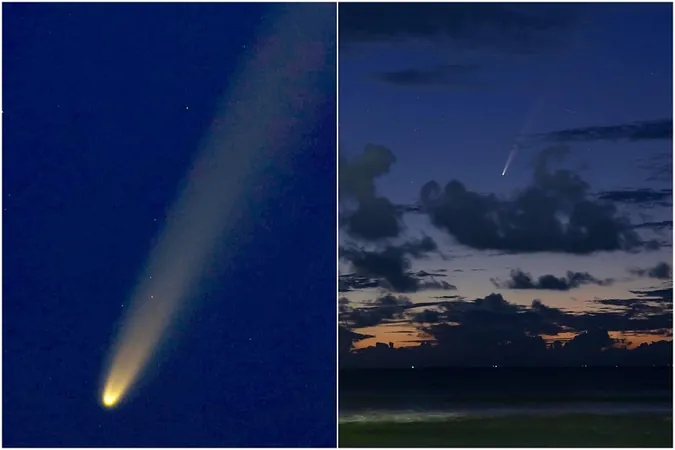
Rare Comet C/2023 A3 to Dazzle Singapore's Night Sky from October 11-22
2024-10-07
Author: Siti
SINGAPORE – A spectacular astronomical event is set to unfold as Comet C/2023 A3 (Tsuchinshan–Atlas) graces Singapore's night sky starting this weekend.
Stargazers and astronomy lovers will have the unique opportunity to witness this celestial phenomenon without the need for binoculars or telescopes.
According to local astronomical societies, the comet has already been catching the attention of observers in Singapore over the past few weeks, notably visible in the pre-dawn hours.
It will be most prominent in the western part of the island from October 11 to October 22, with optimal viewing conditions expected due to relatively low light pollution.
The Science Centre Observatory (SCOB) predicts that the comet will reach its peak brightness on October 11.
However, due to its proximity to the Sun on this date, visibility may be challenging as sunlight could obscure the comet's light.
The best viewing window is anticipated between October 14 and October 20, particularly after sunset when observers may be able to spot the comet with the naked eye.
Dr. Koh Wee Ming, Assistant Honorary Secretary of The Astronomical Society of Singapore (TASOS), suggests that October 14 will likely provide the best chance for skywatchers to catch a glimpse of the comet, positioned in the western sky shortly after sunset.
Viewing conditions will depend on various factors including weather, atmospheric clarity, and the comet’s behavior.
For optimal viewing, the NTU Astronomical Society recommends heading out around 7:30 PM, approximately 20 to 30 minutes post-sunset.
The comet will gradually move away from the Sun each night, offering longer visibility during this period.
However, as the days pass, observers should note that the comet may dim and become harder to see due to its ever-increasing distance from Earth.
To enhance the viewing experience, experts advise finding locations with clear views of the western horizon, preferably areas with minimal artificial light interference, like parks or near bodies of water.
The Science Centre plans to host a virtual viewing session on October 17 from 7 PM to 8 PM, weather permitting, where viewers can enjoy a live stream from a telescope at the observatory.
Dr. Koh emphasizes persistence, encouraging observers to keep trying each night if they are unable to see the comet immediately.
“Don’t give up; keep looking,” he advises.
Background on Comet C/2023 A3
Comets, formations of dust, ice, and gases leftover from the infancy of the solar system approximately 4.6 billion years ago, are known for their striking tails produced by the sublimation of ice into gas and dust as they approach the Sun.
Comet C/2023 A3 may have a highly prolonged orbit, taking millions of years to approach this near-Earth trajectory, or it could be a transient visitor that will not return.
This comet's arrival has generated excitement within the astronomy community, with its brightness potentially exceeding several notable past comets.
Astrophotographer Akash Anandh highlights the rarity of naked-eye comets, noting that such sightings can be unpredictable, with stretches of years with none visible.
Comets are typically named after their discoverers or the observatories responsible for their identification.
In this instance, "Tsuchinshan-Atlas" refers to the Purple Mountain Observatory in China, which detected the comet on January 9, 2023, along with the Asteroid Terrestrial-impact Last Alert System (Atlas) observatory in Africa on February 22, 2023.
The designation “C” in C/2023 A3 signifies long-period comets, which complete their orbit every 200 years or more.
The year “2023” marks the discovery, and the letter “A” indicates it was the first comet found in the first half of January 2023.
Conclusion
Don't miss this rare chance to behold a mesmerizing comet illuminating Singapore's night sky!
Whether you're an avid astronomer or simply curious, bundle up, head outdoors, and marvel at the wonders of the universe!




 Brasil (PT)
Brasil (PT)
 Canada (EN)
Canada (EN)
 Chile (ES)
Chile (ES)
 España (ES)
España (ES)
 France (FR)
France (FR)
 Hong Kong (EN)
Hong Kong (EN)
 Italia (IT)
Italia (IT)
 日本 (JA)
日本 (JA)
 Magyarország (HU)
Magyarország (HU)
 Norge (NO)
Norge (NO)
 Polska (PL)
Polska (PL)
 Schweiz (DE)
Schweiz (DE)
 Singapore (EN)
Singapore (EN)
 Sverige (SV)
Sverige (SV)
 Suomi (FI)
Suomi (FI)
 Türkiye (TR)
Türkiye (TR)